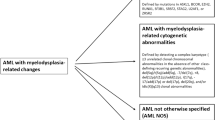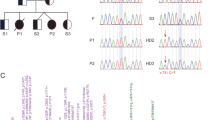Abstract
Systemic mast cell activation syndrome is a mast cell disorder characterized by an unregulated increased activation of mast cells leading to a pathologically enhanced release of mediators. Mutations in tyrosine kinase kit which crucially determines mast cell activity have been suggested as a necessary condition for the development of a clinically symptomatic mast cell disease. At the level of mRNA in mast cell progenitor cells of 20 patients with systemic mast cell activation syndrome and of 20 gender- and age-matched healthy volunteers, the tyrosine kinase kit was investigated for genetic alterations by means of RT-PCR and direct sequencing of the amplificates. In mast cells of 13 out of these 20 patients, multiple predominantly novel potential functionally activating point mutations or complex alterations of the mRNA sequence encoding the tyrosine kinase kit were detected. In contrast, in 19 of the 20 healthy subjects, no functionally relevant alterations of c-kit transcripts were detected. The present findings support the idea that the systemic mast cell activation syndrome is a clonal disease most commonly associated with variable activating mutations in the tyrosine kinase kit.


Similar content being viewed by others
References
Alfter K, von Kügelgen I, Haenisch B et al (2009) New aspects of liver abnormalities as part of the systemic mast cell activation syndrome. Liver Int 29:181–186
Alvarez-Twose I, González de Olano D, Sánchez-Muñoz L et al (2010) Clinical, biological, and molecular characteristics of clonal mast cell disorders presenting with systemic mast cell activation symptoms. J Allergy Clin Immunol 125:1269–1278
Bandi SR, Brandts C, Rensinghoff M et al (2009) E3 ligase-defective Cbl mutants lead to a generalized mastocytosis and a myeloproliferative disease. Blood 114:4197–4208
Bodemer C, Hermine O, Palmérini F et al (2010) Pediatric mastocytosis is a clonal disease associated with D(816)V and other activating c-KIT mutations. J Invest Dermatol 130:804–815
Castells M, Austen KF (2002) Mastocytosis: mediator related signs and symptoms. Int Arch Allergy Immunol 127:147–152
Chu SC, Tang JL, Li CC (2006) Dasatinib in chronic myelogenous leukemia. N Engl J Med 355:1062–1063
Duensing A, Medeiros F, McConarty B et al (2004) Mechanisms of oncogenic KIT signal transduction in primary gastrointestinal stromal tumors (GISTs). Oncogene 23:3999–4006
Fontalba A, Real PJ, Fernandez-Luna JL, Agirre X, Prosper F, Richard C (2006) Identification of c-Kit gene mutations in patients with polycythemia vera. Leuk Res 30:1325–1326
Foster R, Byrnes E, Meldrum C et al (2008) Association of paediatric mastocytosis with a polymorphism resulting in an amino acid substitution (M541L) in the transmembrane domain of c-KIT. Br J Dermatol 159:1160–1169
Fritsche-Polanz R, Jordan JH, Feix A, Sperr WR (2001) Mutation analysis of c-KIT in patients with myelodysplastic syndromes without mastocytosis and cases of systemic mastocytosis. Br J Haematol 113:357–364
Galli SJ, Kalesnikoff J, Grimbaldeston MA, Piliponsky AM, Williams CM, Tsai M (2005) Mast cells as "tunable" effector and immunoregulatory cells: recent advances. Annu Rev Immunol 23:749–786
Goncalves A, Monges G, Yang Y (2006) Response of a KIT-positive extra-abdominal fibromatosis to imatinib mesylate and KIT genetic analysis. J Natl Cancer Inst 98:562–563
Gotlib J, Cross NCR, Gilliland DG (2006) Eosinophilic disorders: Molecular pathogenesis, new classification, and modern therapy. Best Pract Res Clin Haematol 19:535–569
Heinrich MC, Corless CL, Demetri GD et al (2003) Kinase mutations and imatinib response in patients with metastatic gastrointestinal stromal tumor. J Clin Oncol 21:4342–4349
Heinrich MC, Corless CL, Blanke CD et al (2006) Molecular correlates of imatinib resistance in gastrointestinal stromal tumors. J Clin Oncol 24:4764–4774
Hermine O, Lortholary O, Leventhal PS et al (2008) Case-control cohort study of patients’ perceptions of disability in mastocytosis. PLoS ONE 3:e2266
Inokuchi K, Yamaguchi H, Tarusawa M et al (2002) Abnormality of c-kit oncoprotein in certain patients with chronic myelogenous leukemia—potential clinical significance. Leukemia 16:170–177
Kohl TM, Schnittger S, Ellwart JW, Hiddemann W, Spiekermann K (2005) KIT exon 8 mutations associated with core-binding factor (CBF)-acute myeloid leukemia (AML) cause hyperactivation of the receptor in response to stem cell factor. Blood 105:3319–3321
Kolck UW (2009) Investigations on the pathogenesis of the systemic mast cell activation syndrome and its impact on heart function. Bonn, University, medical thesis; URN:nbn:de:hbz:5N-19064; http://hss.ulb.uni-bonn.de/2009/1906/1906.htm [in German]
Lennartsson J, Voytyuk O, Heiss E, Sundberg C, Sun J, Ronnstrand L (2005) c-Kit signal transduction and involvement in cancer. Cancer Ther 3:5–28
Lev S, Yarden Y, Givol D (1992) A recombinant ectodomain of the receptor for the stem cell factor (SCF) retains ligand-induced receptor dimerization and antagonizes SCF-stimulated cellular responses. J Biol Chem 267:10866–10873
Lim KH, Tefferi A, Lasho TL et al (2009) Systemic mastocytosis in 342 consecutive adults: survival studies and prognostic factors. Blood 113:5727–5736
Mayerhofer M, Gleixner KV, Hoelbl A et al (2008) Unique effects of KIT D816V in BaF3 cells: induction of cluster formation, histamine synthesis, and early mast cell differentiation antigens. J Immunol 180:5466–5476
Molderings GJ, Kolck U, Scheurlen C et al (2006) Systemic mast cell disease with gastrointestinal symptoms—a diagnostic questionnaire. Dtsch Med Wochenschr 131:2095–2100 [in German with English abstract]
Molderings GJ, Kolck UW, Scheurlen C, Brüss M, Homann J, von Kügelgen I (2007) Multiple novel alterations in Kit tyrosine kinase in patients with gastrointestinally pronounced systemic mast cell activation disorder. Scand J Gastroenterol 42:1045–1053
Nagata H, Worobec AS, Metcalfe DD (1996) Identification of a polymorphism in the transmembrane domain of the protooncogene c-kit in healthy subjects. Exp Clin Immunogenet 13:210–214
Orfao A, Garcia-Montero AC, Sanchez L, Escribano L, REMA (2007) Recent advances in the understanding of mastocytosis: the role of KIT mutations. Br J Haematol 138:12–30
Ozer O, Zhao YD, Ostler KR et al (2008) The identification and characterisation of novel KIT transcripts in aggressive mast cell malignancies and normal CD34+ cells. Leuk Lymphoma 49:1567–1577
Rocha J, Luz Duarte M, Marques H et al (2010) Association of adult mastocytosis with M541L in the transmembrane domain of KIT. J Eur Acad Dermatol Venereol 24:1118–1119
Tayal S, Classen E, Bemis L, Robinson WA (2005) C-kit expression in dedifferentiated and well-differentiated liposarcomas; immunohistochemistry and genetic analysis. Anticancer Res 25:2215–2220
Teodosio C, García-Montero AC, Jara-Acevedo M et al (2010) Mast cells from different molecular and prognostic subtypes of systemic mastocytosis display distinct immunophenotypes. J Allergy Clin Immunol 125:719–726
Valent P, Horny HP, Escribano L et al (2001) Diagnostic criteria and classification of mastocytosis: a consensus proposal. Leuk Res 25:603–625
Valent P, Akin C, Escribano L et al (2007) Standards and standardization in mastocytosis: consensus statements on diagnostics, treatment recommendations and response criteria. Eur J Clin Invest 37:435–453
Vendôme J, Letard S, Martin F et al (2005) Molecular modeling of wild-type and D816V c-Kit inhibition based on ATP-competitive binding of ellipticine derivatives to tyrosine kinases. J Med Chem 48:6194–6201
Yang Y, Létard S, Borge L (2010) Pediatric mastocytosis-associated KIT extracellular domain mutations exhibit different functional and signaling properties compared with KIT-phosphotransferase domain mutations. Blood 116:114–1123
Yuzawa S, Opatowsky Y, Zhang Z, Mandiyan V, Lax I, Schlessinger J (2007) Structural basis for activation of the receptor tyrosine kinase KIT by stem cell factor. Cell 130:323–334
Acknowledgements
The technical assistance of Mrs. R. Müller and Mrs. P. Spitzlei is gratefully acknowledged. We wish to thank all patients and healthy volunteers as well as the staff of the blood bank of the University Hospital of Bonn. The study was supported by grants of the Deutsche Krebshilfe, Novartis UK and the Förderclub Mastzellforschung.
Authors’ contributions
All authors contributed to the study design and drafting of the report. KM, UWK, JH, and TF recruited the patients and performed the clinical checkup of the patients. GJM, KM, and UWK did the mutational analysis. Statistical analyses were done by GJM. All authors have seen and approved the final version of the manuscript.
Author information
Authors and Affiliations
Corresponding author
Rights and permissions
About this article
Cite this article
Molderings, G.J., Meis, K., Kolck, U.W. et al. Comparative analysis of mutation of tyrosine kinase kit in mast cells from patients with systemic mast cell activation syndrome and healthy subjects. Immunogenetics 62, 721–727 (2010). https://doi.org/10.1007/s00251-010-0474-8
Received:
Accepted:
Published:
Issue Date:
DOI: https://doi.org/10.1007/s00251-010-0474-8




